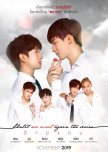Why Until We Meet Again is special among Thai BLs
Until We Meet Again is one of my favorite Thai BLs of all time.
I wouldn’t say it subverts tropes so much as it utilizes them as a spice for story, rather than utterly depending upon them. Most BLs (out of Thailand in particular) turn the tropes into the story. The narrative is entirely dependent on BL tropes for scene structure and plot. They are BL trope reliant/dependent.
UWMA is not like that at all.
Another way of putting it is that if you pulled all the BL specific tropes out of something like, oh I don’t know, 2gether, it would actually fall completely apart.
Now, I’m not talking about the romance foundational tropes like fated mates or fake relationship, those form the narrative backbone of any romance story (and most BL is romance). I’m talking about visual element tropes like baby is a floppy drunk, or the dreaded sponge bath, or wound tending, sharing earbuds, sharing a closet, etc...
For something like 2gether, these tropes ARE VITAL to moving the story along, fixing pacing issues, etc.. Which is FINE. That’s how most hey-day yaoi is. It’s how many contemporary romances are now.
But with Until We Meet Again if you removed all the BL tropes, the story would still be there, standing strong. The tropes add BL flavor to the series, like a spice, but in essence UWMA is actually just a fated mates romance, and it would stand strong as such if all the tropes were striped away (although we would probably lose WinTeam under those circumstances).
Another series that recently acts this way is 1000 Stars. Which is why, I think, it had such broad appeal and rabid fans.
Since it also doesn’t have a suicide element trigger, I would poset that 1000 Stars is actually one of the best BLs to recommend to outside watchers in order to lure them into the genre. Until it came out i tended to rec UWMA with a trigger warning, now I’ll probably be pimping 1k* first.
I wouldn’t say it subverts tropes so much as it utilizes them as a spice for story, rather than utterly depending upon them. Most BLs (out of Thailand in particular) turn the tropes into the story. The narrative is entirely dependent on BL tropes for scene structure and plot. They are BL trope reliant/dependent.
UWMA is not like that at all.
Another way of putting it is that if you pulled all the BL specific tropes out of something like, oh I don’t know, 2gether, it would actually fall completely apart.
Now, I’m not talking about the romance foundational tropes like fated mates or fake relationship, those form the narrative backbone of any romance story (and most BL is romance). I’m talking about visual element tropes like baby is a floppy drunk, or the dreaded sponge bath, or wound tending, sharing earbuds, sharing a closet, etc...
For something like 2gether, these tropes ARE VITAL to moving the story along, fixing pacing issues, etc.. Which is FINE. That’s how most hey-day yaoi is. It’s how many contemporary romances are now.
But with Until We Meet Again if you removed all the BL tropes, the story would still be there, standing strong. The tropes add BL flavor to the series, like a spice, but in essence UWMA is actually just a fated mates romance, and it would stand strong as such if all the tropes were striped away (although we would probably lose WinTeam under those circumstances).
Another series that recently acts this way is 1000 Stars. Which is why, I think, it had such broad appeal and rabid fans.
Since it also doesn’t have a suicide element trigger, I would poset that 1000 Stars is actually one of the best BLs to recommend to outside watchers in order to lure them into the genre. Until it came out i tended to rec UWMA with a trigger warning, now I’ll probably be pimping 1k* first.
Considerați utilă această recenzie?

























